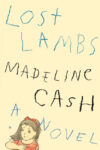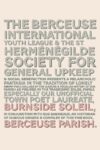by Amanda Shubert
This is not an editorial statement, but some notes towards one, because it originated in precisely that way: as an e-mail from me to the other Full Stop editors when our website launched two weeks ago. I admit that my first act as an editor of Full Stop was to write a critique of Full Stop. When Alex Shephard, Jesse Montgomery and Max Rivlin-Nadler wrote back encouraging me to turn my thoughts into a piece for the site, I think it was clear to all of us that we would get along just fine. Not because we necessarily saw eye to eye on the issues I raised, but because we were all drawn to an editorial process that’s first unfolding showcased revision and dissent. I wanted to incite debate, and they wanted to preserve it—and to respond, which is why you will find Alex’s reflections on my essay here on Wednesday.
It might reveal more about my temperament than the website that as soon as our program was fixed in writing I had the urge to turn it upside down. But then again, this dynamic (or compulsive) re-shuffling of content and perspective is precisely the kind of indulgence the online medium affords. Rowdy and multi-vocal, earnest but without journalistic finish, Full Stop will be prone to internal contradiction. Similarly, our editorial board is not a united front, nor do we intend to be. Our work is our best attempt, and it’s both personal and provisional: the final word only for us, and only for the time being. It’s in this spirit we’ve printed my original email below; it’s our intent to open up an honest discussion about what Full Stop can be, and, by extension, what the stakes are for doing literary criticism today. Check back on Wednesday for Alex’s remarks, and please join in the conversation by leaving comments on this post.
*
To: Alex Shephard, Jesse Montgomery, Max Rivlin-Nadler
From: Amanda Shubert
Date: Mon, Jan 10, 2011 at 2:31 PM
Subject: thoughts on an editorial statement
Hi Jesse, Alex and Max:
The website looks fantastic, the pieces you all wrote up there are really good, and I am beyond excited to be a part of Full Stop.
I wanted to share some thoughts on the About section/Full Stop manifesto, with apologies in advance for the soap box from which I am about to pontificate. I trust you’ll take this in the spirit it’s meant—not as undermining or disparaging the wonderful work you’ve done, but as an initial foray into the larger editorial conversation that I am so grateful to be a part of.
RE: your claim that “despite the popular critical sentiment that the “death of the novel” is upon us, we submit that the opposite is true and refute the fatalism inherent in a narrative that threatens to ignore the diversity and quality of contemporary fiction.”
Yes. But—conversely—doesn’t the critical sentiment that the novel is alive and well ignore the falling rate of literacy, the degree to which we frame knowledge in statistical, economic and scientific terms, the fact that as a society we privilege consumption over reflection, the decline of the humanities in the academy, and the violently anti-intellectual positions promoted in politics, news sources and even many cultural institutions? I don’t think optimism is wrong, but I think cautious optimism is better—I’m more interested in an optimism located in thinking critically about these problems and our position (as readers and critics) within that context. An optimism that comes from saying, “these things that affect literature and literary culture are really terrible, but I can think rigorously about them and write subtly about books from that angle, and this is a form of resistance.” I also think that optimism can be a sheltered response, because we all belong to vibrant liberal communities where criticism and debate are primary and people mostly vote the same way (even if that community isn’t home, but the liberal arts college/Full Stop community). I think it’s important to acknowledge, at least for ourselves, how profoundly this is a niche culture.
I don’t argue with the premise you set forth here: we stand for the exciting potential of dialog about literature today, and we experience the novel as very much alive. But the issue is more complicated than “the death of the novel”/”the opposite is true”—saying the opposite is true makes our vision sound as monolithic as “the novel is dead,” which is the kind of rhetoric I think you’re critiquing here. So it seems like there are two separate issues: 1) goofy rhetoric about the death of the novel and the decline of western civilization because of the invention of Twitter; 2) a serious and real cultural decline. For 1) we can call a spade a spade and a stupid argument a stupid argument; for 2) we can’t dismiss this so easily. “The death of the novel” arguments and their implicit statement about the complacency of our generation might seem “condescending and rather silly,” as you put it, but I don’t think we can just dismiss the broader cultural problems—they are real and they’re worth addressing. What if we sought to explicate, complicate, interpret “the fatalism inherent in a narrative that threatens to ignore the diversity and quality of contemporary fiction,” rather than simply refuting it?
My point is that we should take a stance within this context, rather than pushing it to the side. To me, seeing criticism as autonomous from the social, political and economic times we’re living in right now (times I find scary and bleak) is one source of the perceived anemic or impotent quality of literature today: that it’s insulated from the urgent problems and fears that we all face about jobs, wars, banks, schools, courts, government, terrorism, global warming, fill in your fear for the future here. Personally, I want to take a stand for the way reflection and interpretation, dealing in ambiguity and paradox, living with fiction, being critical and imaginative readers, can make us stronger socially and spiritually; I want to acknowledge the diminished status of those values; and I don’t want to claim that I can solve the problem of how doing literature and criticism can save our souls, only that I can wrestle with it. In a conversation a couple of months ago, my undergraduate advisor put it to me this way: “how do we operate with faith in a faithless world when our best tools involve a skepticism about that faith?” This is the paradox of criticism: it builds and unbuilds simultaneously—it reminds us that skepticism is not the opposite of belief but rather another articulation of belief.
I have more questions than answers about what it means to write criticism about literature today, as I imagine you all do, but, frankly, I think that’s a fine place to begin—with questions that aren’t answered by yes/no (is Twitter the death of the novel?), but are honest and are larger than any solution can satisfy. It seems like this is what you’re getting at by encouraging us to experiment with the form of the review, soliciting longer form essays on open topics, “representing no party or clique,” and decrying statements about “the death of the novel,” so I hope I’m not too presumptuous to assume we are generally on the same page here. I would consider revising the editorial statement to be more about questions than platforms—or at least acknowledge that all platforms are actually based on questions—and to broaden the mission of literary criticism by considering its social implications. I realize all this may sound bizarre and cumbersome, but I actually don’t think it’s all that different from what you’ve set forth.
If you’re open to another draft of that statement, I can make some specific suggestions. If you’re not, but any of this seems interesting to you, let’s talk or argue about it. Finally, feel free to say: look, Amanda, this really is not what we’re all about.
sincerely,
Amanda
This post may contain affiliate links.








